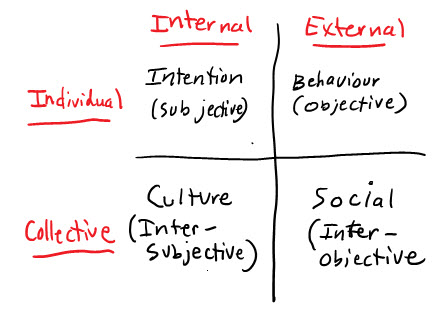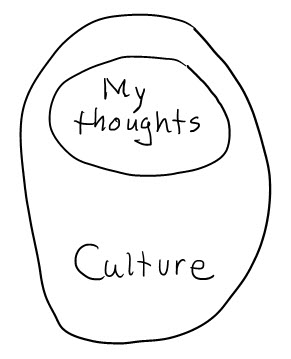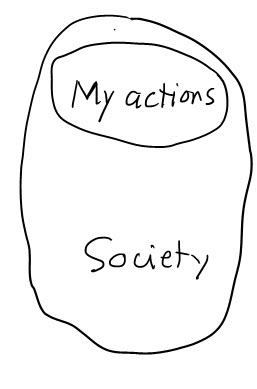When in conflict, the source of the conflict can be confusing, never mind the way out! Ken Wilbur’s Integral Vision is a handy, big picture, framework that can be applied to conflict management:
Wilbur’s model is not dedicated to conflict. It applies to everything, literally, as I discovered in his A Theory of Everything. Each quadrant provides a context for understanding and growth.
(A big shout out to Michael Shoop. Michael’s consulting work is firmly rooted in the Integral approach. Our conversation at a recent Victoria Mediator’s Lounge prompted me to expand my own understanding, e.g., via this post, on the Integral front.)
Wilbur studies and categorizes items in terms of their nature as a holon; the idea that we are something in whole and part. “We are both an autonomous, self-reliant unit unto ourselves, and we are also a part of one (or more) other wholes.” This is not unlike systems thinking; a belief that the component parts of a system can best be understood in the context of relationships with each other, and with other systems, rather than in isolation.
My internal thoughts and intentions are all mine. They are also connected to what others’ think; their internal thoughts. This collective understanding is culture. Culture is what we do when no one is watching us. There is a relationship.
Similarly, my behaviours/actions are out there, observable, very likely measurable. They are also part of our collected behaviours, in our workplace, community, society… There is a relationship.
In conflict – we are something in whole and part
Good questions are the genesis of conflict mastery.
As a conflict sleuth:
Are my internal thoughts at odds with cultural “norms”? Am I the only one who thinks this is wrong?
What if my actions reflect cultural norms, yet my thoughts don’t? “Even though I don’t believe in it, I’ll do it, just to make you happy” is probably not the best modus operandi.
If culture trumps everything, where does that leave me, when the predominant workplace culture is not my culture?
As a conflict sleuth:
Are my actions at odds with what others are doing? If yes, then conflict?
What if my actions reflect those in the group, yet my thoughts don’t? “Even though I don’t believe in it, I’ll do it, just to make you happy.”
My behaviour helps us collectively get things done, yet none of us really believe what we’re doing is of true value. How is this sustainable?
Integral thinking as a way to visualize the big picture
Complex problems require integral, holistic, systems… (whatever you call it) ways of thinking.
Better workplaces? Focus on basic needs, to start with, as Tony Schwartz advocates, as my local Community Social Planning Council advocates…
Online privacy? Recognize that all those social media fruits come with a cost; The Black Box Society, The Price of Convenience… Let’s put us (customers) back in charge.
Walkable cities? Start with some principles. A higher Walk Score is sure to follow!
How do you visualize the big (conflict) picture?




Speak Your Mind